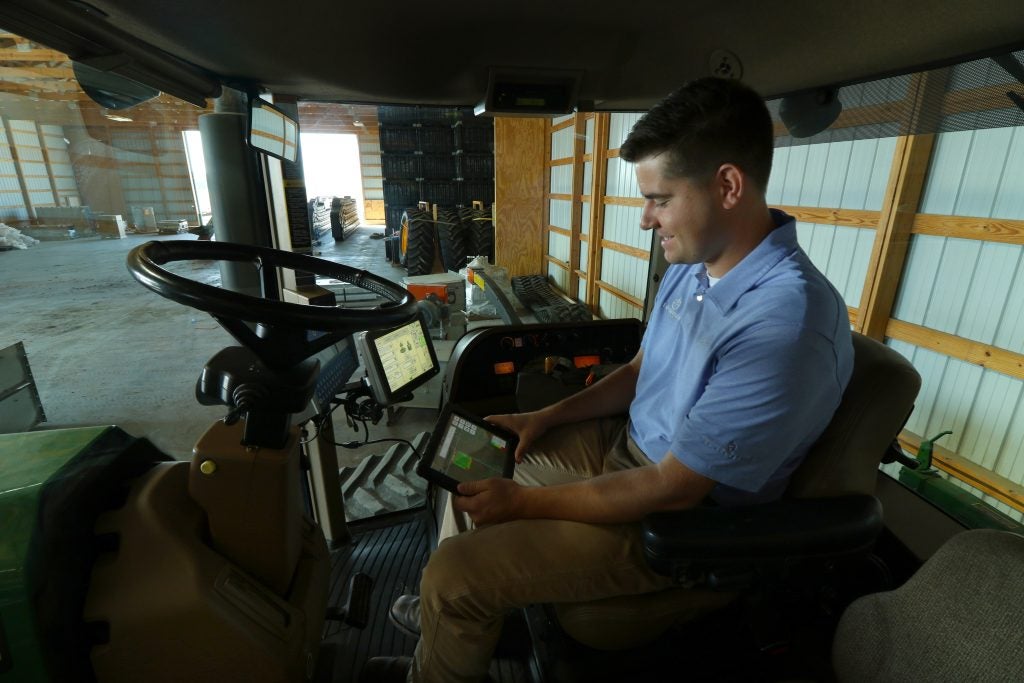Sunday’s edition of “60 Minutes” featuring an interview with Land O’Lakes CEO Beth Ford put an urgent spotlight on the struggles that farmers are feeling from weather, tariffs and low prices.
From massive rainfall in the Midwest to flash droughts across the South, extreme weather is becoming a top concern among farmers, many of whom are acknowledging that climate change is impacting their operations, and they’re committing to resilience strategies. EDF’s farmer partners are telling us firsthand how climate change is altering their livelihoods, and they are thirsty for climate-smart tools and practices.
Ford rightly hones in on the role that technology plays in helping farmers hedge against the unpredictable in today’s tough environment and economy. Precision ag tools and technologies optimize inputs to achieve a more robust crop yield, in addition to healthier soils, improved water quality and other environmental benefits.
Technology is essential to advancing sustainability, but not without the corresponding informational, financial and policy drivers that will ultimately help us reach the goal of a resilient agricultural system.
Making fertilizer pollution obsolete
A new generation of tech-savvy, data-hungry young farmers are reinventing agriculture by analyzing data gathered from sensors, tractors and satellites.
Tackling fertilizer loss is a top priority. Excess fertilizer is not only a wasted expense, but is a primary contributor to severe water quality challenges and can release nitrous oxide – a greenhouse gas almost 300 times more potent than carbon dioxide.
Farmers and food companies need credible and accessible information about how to keep their fertilizer use in balance – using not too much and not too little. Plus, farmers need the flexibility to use the practices that will work best for their farm – whether it’s planting cover crops, using buffers or reduced till. That’s precisely what my colleagues and our partners at major food and ag tech companies are working to do through N Balance.
It’s only a matter of time before all farmers are able to realize the power of their conservation practices and understand how they can make their farms more resilient to climate change.
Farmers are already realizing the financial benefits of conservation
I’ve heard directly from farmer friends in the Midwest (who faced those record-breaking floods this year) that the work they are doing with my EDF colleagues to adopt conservation practices are making them more resilient, enabling them to get more acres planted and sustain better yields than many of their neighboring farmers were able to this spring.
Their stories are not one-off experiences.
EDF published a farm finance study last year, finding that conservation consistently delivers measurable economic value to farmers and their financial partners. The study found that farmers who adopted no-till, cover crops, nutrient optimization and crop rotation experienced a cascade of cost savings, including lower fertilizer, labor, fuel and equipment costs. A similar study with several Pennsylvania dairy farmers, to be released soon, is indicating similar findings. Technology is essential to advancing agricultural sustainability, but not without additional informational, financial and policy drivers. Share on X
Overall, farmers are realizing substantial returns on investments in conservation. And the value of diversified income streams, increased yield resilience, lowered costs and reduced risk extend far beyond the farm field.
We need big investments in a sustainable food system, not bailouts
With conservation practices clearly demonstrating their value to farmers and the environment, we should be investing more in supporting widespread adoption of conservation practices.
USDA’s farm bill conservation programs provide $5-6 billion annually for a range of programs that support farmers and their partners to adopt conservation practices.
In comparison, the Trump Administration has, to date, paid out five times that amount – $28 billion – in “trade aid” that farmers themselves describe not as a solution, but as a Band-Aid for a problem that they see as inflicted by the President’s trade wars.
It’s not difficult to imagine what farmers could do to bolster their long-term resilience if they were provided more funding for programs proven to have long-term benefits. The result would be more resilient farmers, more resilient farming communities and a more resilient food system, which benefits all Americans.










